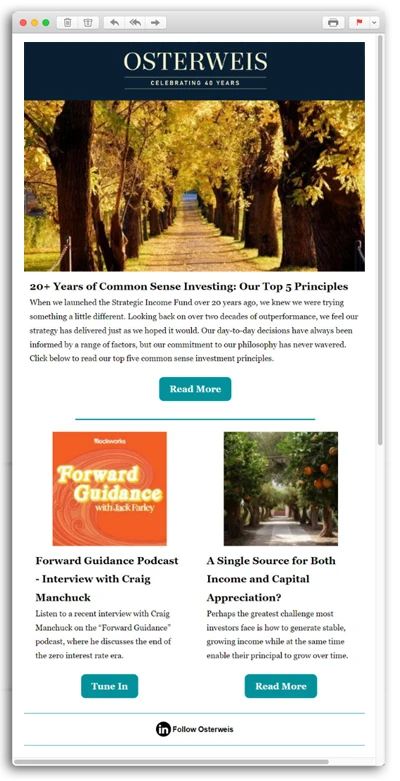Overview
Investment Objective
The Fund seeks to preserve capital and attain long-term total returns through a combination of current income and moderate capital appreciation.
Investment Strategy
- Deploy unconstrained, risk-aware strategy
- Allocate assets strategically based on macroeconomic conditions
- Select securities based on bottom-up, rigorous fundamental and credit analysis
- Utilize disciplined and repeatable process
- Leverage experienced portfolio management team
NAV as of 12/19/25
| Price | $11.23 | Change | $0.00 |
|---|
Fund Facts
| Ticker | OSTIX |
|---|---|
| CUSIP | 742935489 |
| Inception Date | 8/30/2002 |
|
Net Assets (as of 11/30/25) |
$5.9 billion |
| Number of Holdings | 152 |
Fund Documents
| Document | Date |
|---|---|
| Fact Sheet | Sep 2025 |
| Summary Prospectus | Jun 2025 |
Explore our mutual fund options and start your investment journey.
Invest With UsInvestment Team
Carl Kaufman
Co-President, Co-Chief Executive Officer, Chief Investment Officer – Strategic Income & Managing Director – Fixed Income
Performance
Performance
as of 11/30/25
| Fund | 1 MO | QTD | YTD | 1 YR | 3 YR | 5 YR | 10 YR | 15 YR | 20 YR |
INCEP (8/30/2002) |
|---|---|---|---|---|---|---|---|---|---|---|
| OSTIX | 0.28% | 0.22% | 4.94% | 5.22% | 8.43% | 5.06% | 5.28% | 4.95% | 5.74% | 6.17% |
| Bloomberg U.S. Aggregate Bond Index | 0.62% | 1.25% | 7.46% | 5.70% | 4.56% | -0.31% | 1.99% | 2.36% | 3.31% | 3.41% |
Gross expense ratio as of 3/31/25: 0.83%
Performance data quoted represent past performance; past performance does not guarantee future results. The investment return and principal value of an investment will fluctuate so that an investor’s shares, when redeemed, may be worth more or less than their original cost. Current performance of the Fund may be higher or lower than the performance quoted. Performance data current to the most recent month end may be obtained by calling shareholder services toll free at (866) 236-0050.
Rates of return for periods greater than one year are annualized.
as of 9/30/25
| Fund | 1 MO | QTD | YTD | 1 YR | 3 YR | 5 YR | 10 YR | 15 YR | 20 YR |
INCEP (8/30/2002) |
|---|---|---|---|---|---|---|---|---|---|---|
| OSTIX | 0.42% | 1.41% | 4.71% | 6.08% | 9.76% | 5.76% | 5.21% | 5.03% | 5.72% | 6.21% |
| Bloomberg U.S. Aggregate Bond Index | 1.09% | 2.03% | 6.13% | 2.88% | 4.93% | -0.45% | 1.84% | 2.26% | 3.23% | 3.38% |
Gross expense ratio as of 3/31/25: 0.83%
30 Day SEC Yield as of 9/30/25: 5.08%
Performance data quoted represent past performance; past performance does not guarantee future results. The investment return and principal value of an investment will fluctuate so that an investor’s shares, when redeemed, may be worth more or less than their original cost. Current performance of the Fund may be higher or lower than the performance quoted. Performance data current to the most recent month end may be obtained by calling shareholder services toll free at (866) 236-0050.
Rates of return for periods greater than one year are annualized.
Hypothetical Growth of $10,000 Since Inception to 9/30/2025
(Dividends Reinvested)
(Dividends Reinvested)
Calendar Year Performance
| Date | OSTIX | Agg |
|---|---|---|
| 2025 YTD (as of 9/30/25) | 4.71% | 6.13% |
| 2024 | 8.03% | 1.25% |
| 2023 | 12.30% | 5.53% |
| 2022 | -5.94% | -13.01% |
| 2021 | 5.48% | -1.54% |
| 2020 | 9.02% | 7.51% |
| 2019 | 5.35% | 8.72% |
| 2018 | -0.66% | 0.01% |
| 2017 | 5.99% | 3.54% |
| 2016 | 10.95% | 2.65% |
Portfolio Overview as of 9/30/2025
Portfolio Allocation % of Total Portfolio
| Category | Value | |
|---|---|---|
| High Yield* | 66.0% | |
| Cash & Equivalents | 14.8% | |
| Busted Convertibles | 10.4% | |
| Investment Grade | 7.5% | |
| Stocks | 0.8% | |
| Non-Agency MBS/CMO | 0.2% | |
| Equity Sensitive Convertibles | 0.2% |
Securities not included in the high yield category (e.g., convertible bonds, floating rate notes, preferred stocks) may also be rated below investment grade.
MBS/CMO = Mortgage Backed Securities/Collateralized Mortgage Obligations
Portfolio Characteristics
| Characteristic | OSTIX |
|---|---|
| Weighted Average Coupon (%) | 5.15 |
| Weighted Average Effective Duration | 1.32 |
| Weighted Average Years to Maturity | 2.56 |
| Weighted Average Yield to Maturity (%) | 6.08 |
| 30 Day SEC Yield (%) | 5.08 |
| Income Distribution Yield (%) | 5.44 |
Click here for standardized fund performance.
Performance data quoted represent past performance; past performance does not guarantee future results. The investment return and principal value of an investment will fluctuate so that an investor’s shares, when redeemed, may be worth more or less than their original cost. Current performance of the Fund may be higher or lower than the performance quoted. Performance data current to the most recent month end may be obtained by calling shareholder services toll free at (866) 236-0050.
The characteristics are calculated only on the Fund’s fixed income holdings and cash. This information is believed to be reliable, but it is not guaranteed. Weighted averages are by security market value. Average yield to maturity excludes all bonds with yields at or above 50% and that are maturing within a year or have been called, all equity-sensitive convertibles whose price is at or above $135, and all bonds that are maturing within 5 calendar days. Effective Duration is from Bloomberg. Average coupon and yield to maturity are calculated gross of fees and expenses.
The income distribution yield is based on the prior 12 months’ distributions divided by the net asset value of the period end date. The distribution yield does not contain any return of capital.
Sector Exposure % of Portfolio Excluding Cash & Equivalents
| Category | Value | |
|---|---|---|
| Industrials | 25.56% | |
| Consumer Discretionary | 21.58% | |
| Financials | 13.94% | |
| Materials | 7.49% | |
| Consumer Staples | 7.04% | |
| Information Technology | 5.82% | |
| Health Care | 5.71% | |
| Communication Services | 4.64% | |
| Energy | 4.48% | |
| Real Estate | 2.14% | |
| Utilities | 1.60% |
Maturity % of Fixed Income & Cash
| Category | Value | |
|---|---|---|
| Cash & Equivalents | 14.9% | |
| <1 Year | 23.5% | |
| 1-3 Years | 21.8% | |
| 3-5 Years | 29.0% | |
| >5 Years | 10.8% |
Effective Duration % of Fixed Income & Cash
| Category | Value | |
|---|---|---|
| Cash & Equivalents | 14.9% | |
| < 1 Year | 43.1% | |
| 1-3 Years | 24.4% | |
| 3-5 Years | 17.0% | |
| >5 Years | 0.5% |
Credit Quality Exposure % of Total Portfolio
| Category | Value | |
|---|---|---|
| Government | 0.0% | |
| AAA | 0.0% | |
| AA | 0.0% | |
| A | 0.0% | |
| BBB | 7.6% | |
| BB | 30.0% | |
| B | 28.8% | |
| Below B | 4.0% | |
| Not Rated Securities | 14.9% | |
| Cash & Equivalents | 14.8% |
Country Exposure % of Total Portfolio
| Category | Value | |
|---|---|---|
| United States (including cash & equivalents) | 92.0% | |
| Canada | 2.8% | |
| United Kingdom | 1.8% | |
| Ireland | 1.2% | |
| Switzerland | 0.9% | |
| Japan | 0.6% | |
| France | 0.5% | |
| Australia | 0.2% |
Top 10 Holdings % of Portfolio Excluding Cash & Equivalents
| Holding | Value |
|---|---|
| Unisys Corp 144A 10.625% 1/15/31 | 1.5% |
| Conduent Business Services LLC / Conduent State & Local Solutions Inc 144A 6.000% 11/1/29 | 1.3% |
| Vistra Operations Co LLC 144A 5.500% 9/1/26 | 1.3% |
| GGAM Finance Ltd 144A 7.750% 5/15/26 | 1.2% |
| United Natural Foods Inc 144A 6.750% 10/15/28 | 1.2% |
| Airbnb Inc 0.000% 3/15/26 | 1.2% |
| Cable One Inc 0.000% 3/15/26 | 1.2% |
| KeHE Distributors LLC / KeHE Finance Corp / NextWave Distribution Inc 144A 9.000% 2/15/29 | 1.1% |
| HAT Holdings I LLC / HAT Holdings II LLC 144A 3.375% 6/15/26 | 1.1% |
| Coeur Mining Inc 144A 5.125% 2/15/29 | 1.1% |
| Total | 12.1% |
Complete holdings are generally available ten business days following quarter end.
The Osterweis Strategic Income Fund’s holdings and sector allocations may change at any time due to ongoing portfolio management. References to specific investments should not be construed as a recommendation to buy or sell the securities by the Fund or Osterweis Capital Management.
Fiscal Year Turnover
| Year Ended March 31 |
Turnover |
|---|---|
| 2025 | 40% |
| 2024 | 24% |
| 2023 | 10% |
| 2022 | 49% |
| 2021 | 60% |
| 2020 | 40% |
| 2019 | 46% |
| 2018 | 53% |
| 2017 | 37% |
| 2016 | 31% |
Not a full year, only covers 8/30/02-3/31/03
Fees & Distributions
Distribution Schedule
The Osterweis Strategic Income Fund distributes income monthly and capital gains once a year in December. (Effective October 2024, the fund is distributing income monthly, and the December income and capital gains distribution date was updated.)
| Record Date | Ex./Pay and Reinvest Date | |
|---|---|---|
| January Income Distribution | 1/28/25 | 1/29/25 |
| February Income Distribution | 2/25/25 | 2/26/25 |
| March Income Distribution | 3/26/25 | 3/27/25 |
| April Income Distribution | 4/25/25 | 4/28/25 |
| May Income Distribution | 5/27/25 | 5/28/25 |
| June Income Distribution | 6/25/25 | 6/26/25 |
| July Income Distribution | 7/25/25 | 7/28/25 |
| August Income Distribution | 8/26/25 | 8/27/25 |
| September Income Distribution | 9/25/25 | 9/26/25 |
| October Income Distribution | 10/28/25 | 10/29/25 |
| November Income Distribution | 11/24/25 | 11/25/25 |
| December Income & Cap. Gains Distribution | 12/24/25 | 12/26/25 |
Recent Distribution History
| EX./PAY AND REINVEST DATE | ORDINARY INCOME | SHORT-TERM CAP. GAINS | LONG-TERM CAP. GAINS | TOTAL DISTRIBUTION | REINVEST NAV |
|---|---|---|---|---|---|
| 11/25/25 | $0.04148 | $0.00000 | $0.00000 | $0.04148 | 11.17 |
| 10/29/25 | $0.05365 | $0.00000 | $0.00000 | $0.05365 | 11.23 |
| 9/26/25 | $0.04716 | $0.00000 | $0.00000 | $0.04716 | 11.27 |
| 8/27/25 | $0.05107 | $0.00000 | $0.00000 | $0.05107 | 11.27 |
| 7/28/25 | $0.04980 | $0.00000 | $0.00000 | $0.04980 | 11.23 |
| 6/26/25 | $0.04595 | $0.00000 | $0.00000 | $0.04595 | 11.24 |
| 5/28/25 | $0.05252 | $0.00000 | $0.00000 | $0.05252 | 11.15 |
| 4/28/25 | $0.05607 | $0.00000 | $0.00000 | $0.05607 | 11.08 |
| 3/27/25 | $0.04952 | $0.00000 | $0.00000 | $0.04952 | 11.15 |
| 2/26/25 | $0.04315 | $0.00000 | $0.00000 | $0.04315 | 11.23 |
| 1/29/25 | $0.06126 | $0.00000 | $0.00000 | $0.06126 | 11.24 |
| 12/27/24 | $0.03939 | $0.00000 | $0.00000 | $0.03939 | 11.20 |
| 11/26/24 | $0.04350 | $0.00000 | $0.00000 | $0.04350 | 11.20 |
| 10/29/24 | $0.07315 | $0.00000 | $0.00000 | $0.07315 | 11.16 |
| 9/16/24 | $0.14689 | $0.00000 | $0.00000 | $0.14689 | 11.16 |
| 6/17/24 | $0.15119 | $0.00000 | $0.00000 | $0.15119 | 11.03 |
| 3/15/24 | $0.13498 | $0.00000 | $0.00000 | $0.13498 | 10.98 |
| 12/29/23 | $0.01841 | $0.00000 | $0.00000 | $0.01841 | 10.94 |
| 12/15/23 | $0.15307 | $0.00000 | $0.00000 | $0.15307 | 10.85 |
| 9/15/23 | $0.14175 | $0.00000 | $0.00000 | $0.14175 | 10.63 |
| 6/15/23 | $0.18426 | $0.00000 | $0.00000 | $0.18426 | 10.54 |
| 3/15/23 | $0.12846 | $0.00000 | $0.00000 | $0.12846 | 10.34 |
| 12/15/22 | $0.13426 | $0.00000 | $0.00000 | $0.13426 | 10.41 |
| 9/15/22 | $0.12346 | $0.00000 | $0.00000 | $0.12346 | 10.33 |
| 6/15/22 | $0.12350 | $0.00000 | $0.00000 | $0.12350 | 10.39 |
| 3/16/22 | $0.10589 | $0.00000 | $0.00000 | $0.10589 | 11.06 |
| 12/15/21 | $0.10638 | $0.00000 | $0.00000 | $0.10638 | 11.43 |
| 9/15/21 | $0.13701 | $0.00000 | $0.00000 | $0.13701 | 11.58 |
Insights
Literature
| Document | Date |
|---|---|
| Fact Sheet | September 2025 |
| OSTIX Shareholder Letter | October 2025 |
| Summary Prospectus | June 2025 |
| Statutory Prospectus | June 2025 |
| Document | Date |
|---|---|
| Statement of Additional Information | June 2025 |
| Annual Report | March 2025 |
| Semi-Annual Report | September 2025 |
| Proxy Voting Record (N-PX) | June 2025 |
Where applicable, charts illustrating the performance of a hypothetical $10,000 investment made at a Fund’s inception assume the reinvestment of dividends and capital gains, but do not reflect the effect of any applicable sales charge or redemption fees. Such charts do not imply any future performance.
The Bloomberg U.S. Aggregate Bond Index (Agg) is widely regarded as the standard for measuring U.S. investment grade bond market performance. This index does not incur expenses and is not available for investment. The index includes reinvestment of dividends and/or interest income.
Source for any Bloomberg index is Bloomberg Index Services Limited. BLOOMBERG® is a trademark and service mark of Bloomberg Finance L.P. and its affiliates (collectively “Bloomberg”). Bloomberg owns all proprietary rights in the Bloomberg Indices. Bloomberg does not approve or endorse this material, or guarantees the accuracy or completeness of any information herein, or makes any warranty, express or implied, as to the results to be obtained therefrom and, to the maximum extent allowed by law, neither shall have any liability or responsibility for injury or damages arising in connection therewith.
Certain portfolio data may be available as of month-end. To make a request, please email us. Top ten holdings exclude cash and equivalents.
Past performance does not guarantee future results.
The Osterweis Funds are available by prospectus only. The Funds’ investment objectives, risks, charges, and expenses must be considered carefully before investing. The summary and statutory prospectuses contain this and other important information about the Funds. You may obtain a summary or statutory prospectus by calling toll free at (866) 236-0050, or by visiting www.osterweis.com/statpro. Please read the prospectus carefully before investing to ensure the Fund is appropriate for your goals and risk tolerance.
Mutual fund investing involves risk. Principal loss is possible.
The Osterweis Strategic Income Fund may invest in debt securities that are un-rated or rated below investment grade. Lower-rated securities may present an increased possibility of default, price volatility or illiquidity compared to higher-rated securities. The Fund may invest in foreign and emerging market securities, which involve greater volatility and political, economic and currency risks and differences in accounting methods. These risks may increase for emerging markets. Investments in debt securities typically decrease in value when interest rates rise. This risk is usually greater for longer-term debt securities. Small- and mid-capitalization companies tend to have limited liquidity and greater price volatility than large-capitalization companies. Higher turnover rates may result in increased transaction costs, which could impact performance. From time to time, the Fund may have concentrated positions in one or more sectors subjecting the Fund to sector emphasis risk. The Fund may invest in municipal securities which are subject to the risk of default.
While the fund is no-load, management fees and other expenses still apply. Please refer to the prospectus for more information.
Osterweis Capital Management is the adviser to the Osterweis Funds, which are distributed by Quasar Distributors, LLC.











